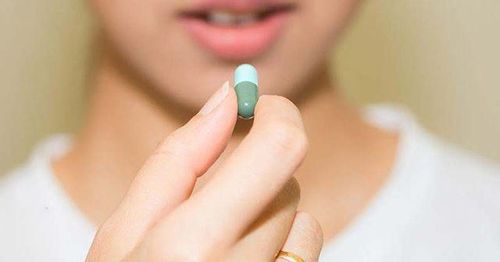This is an automatically translated article.
Iodized salt contains small amounts of sodium iodide or potassium iodide. Iodized baby salt is also made from normal salt, the appearance and taste are the same but there are additional iodine ingredients, bringing many benefits to the development of young children. However, children under 1 year of age who eat salt need to be careful and should give them iodized salt when the diet is full, which is something mothers need to consider.
1. What is Iodine?
Iodine is an essential nutrient for humans. Although only needed in small amounts, this ingredient is extremely important for the growth and development of young children from infancy and also during the first years of life.
Iodine occurs naturally in the marine environment and in some soils, being prepared as iodized salt. In addition, iodine is also found in marine species (including fish, shrimp and seaweed), some plants grown on iodine-rich soils, and in iodine-containing soil herbivore products. In addition, this micronutrient is also added to some processed foods, such as formula milk, canned food, and breads and baked goods.
2. The role of iodine in children's health
Iodine deficiency is a major cause of brain damage in childhood. The consequence of this condition is to lead to a decline in cognitive and motor development, affecting children's performance in school. In adulthood, iodine deficiency also affects labor productivity as well as the ability to find work.
It is especially important for pregnant women to add enough iodine in their diet to prevent iodine deficiency for the fetus and newborn baby at birth. Because iodine is an important nutrient during fetal development, especially for the brain. Iodine deficiency during pregnancy not only leads to fetal brain damage but also causes low birth weight, preterm birth and increased perinatal and neonatal mortality.
Then, young children are also at particularly high risk of iodine deficiency because the brain still needs iodine for development during the first two years of life. In addition, iodine deficiency in children is the cause of goiter, hypothyroidism, physical and cognitive development disorders.
Total iodine deficiency can be easily prevented at low cost, simply by using iodized salt for babies in their daily nutrition. Therefore, the best and least expensive method to prevent this iodine deficiency disorder requires mass mobilization which is currently being implemented in many countries, improving the quality of the population.

Giải đáp có nên cho bé ăn muối iot?
3. Iodine needs and suitable iodine sources for young children
Should the baby eat iodized salt? The following reference values for the amount of iodine needed for children by age are as follows:
Infants aged 0-6 months need 90 μg of iodine per day. Children aged 7-12 months need 110 μg of iodine per day. Children aged 1-8 years need 90 μg of iodine per day. Children 9-13 years old need 120 μg of iodine per day. Adolescents 14-18 years of age need 150 μg of iodine per day. The following foods in the family's weekly diet will help ensure that children are getting enough iodine:
Packaged bread: Commercially prepared breads may already contain iodine. , so check food labels for iodine servings. Seafood: experts recommend eating 2-3 seafood meals per week. However, certain types of fish - such as scalefish, swordfish, and tuna - are higher in mercury than others, so choices should be limited when preparing foods for young children. Canned salmon and seaweed are the best food sources of iodine for children. Eggs, vegetables, meat and dairy products: Contains a certain amount of iodine, but it should be noted that the amount of iodine in these foods varies. Young children fed a vegetarian diet may need to consider iodine supplements or iodine-rich vegan foods such as fortified soy milk and seaweed. Besides the foods containing iodine mentioned above, iodized salt for babies is the choice to provide iodine simply, economically and effectively. Specifically, bread with seasoning ingredients using iodized salt can provide enough iodine without adding iodized salt in the accompanying food.

Khi trẻ lớn hơn 1 tuổi, việc nêm nếm gia vị cho trẻ nên bằng muối iot thay cho muối thông thường
4. Should the baby eat iodized salt?
Newborns need iodine for healthy growth. By feeding their children iodine-rich foods, parents can protect their children from health problems arising from iodine deficiency.
Breast milk is the only and best source of iodine for babies in the first 6 months of life. Breastfeeding is a comprehensive source of nutrition, helping to develop the baby's brain and nervous system. Accordingly, if the child is exclusively breastfed, the child does not need to be supplemented with iodized salt. However, breastfeeding mothers may be advised to take an iodine supplement to ensure that the baby is getting enough iodine. On the contrary, if the baby has to be fed formula milk, the iodine content in milk is enough to provide the baby according to the diet.
Until children learn to eat solids, choosing diverse and rich foods, focusing on marine products, allowing children to continue drinking milk and using dairy products can ensure iodine supply. enough on demand.
As congenital hypothyroidism due to iodine deficiency in children can be diagnosed by urinalysis or thyroid function, this condition as soon as detected needs to be monitored and corrected. At this point, the doctor will consider whether to give the baby iodized salt or not or prescribe therapies to increase the child's iodine content. Giving salt to children under 1 year old, although it can provide necessary iodine for children, may not be good for their kidneys. Moreover, adding salt to the child's diet too soon can affect the child's taste buds, form early salty eating habits and potentially risk future cardiovascular disease.
Thus, when the child is older than 1 year, the seasoning for the child should be with iodized salt instead of ordinary salt. In addition, parents need to pay attention to iodized salt for children to ensure the correct iodine content in the product, which should be stored in a sealed glass or plastic container. When exposed to too much sunlight and moisture, iodized salt can be destroyed and degraded. In addition, iodized salt should be used within 12 months of packaging.
In short, regularly supplementing with iodine in any form is important for children's thyroid and overall development. In particular, using iodized salt for babies is the simplest, most effective and economical way for each family. However, for children under 1 year of age eating salt, too much salt is not good for the health of both children and adults. Therefore, it is best for parents to get iodine from diverse and rich food sources to ensure enough iodine safely for the whole family.
Besides, parents also need to supplement their children with essential micro-minerals such as zinc, lysine, chromium, selenium, vitamin B1, ... to fully meet the nutritional needs of children. The addition of these essential vitamins also supports digestion, enhances nutrient absorption, improves anorexia, and helps children eat well. Parents can simultaneously apply dietary supplements and functional foods derived from nature for easy absorption. The most important thing is that improving your baby's symptoms often takes a long time. Combining many types of functional foods at the same time or changing many types in a short time can make the baby's digestive system unable to adapt and completely not good.
Therefore, parents must be really persistent in accompanying their children and regularly visit the website vimec.com to update useful baby care information.













